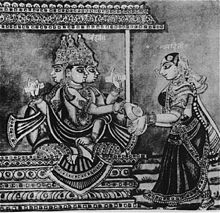Aditi

Aditi ( Sanskrit , f., अदिति , aditi , "unbound", "unlimited", "infinite", "free") is a mother, earth and sky goddess of Hindu mythology , which is already celebrated in the Vedas . More comprehensive and abstract, she is also considered the goddess of infinite space and consciousness, as well as the fertile, protective ruler of the world and its order, who liberates from need and other restrictions.
Aditi is the mother of the Adityas , with whom she is only called together in the Rigveda . The gods are descended from the water, the earth and Aditi, their mother is Djaur-Aditi ("Heavenly Aditi"), who raises them with sweet milk. The Soma "lays the germ in the Aditi womb through which we obtain seeds and offspring". Your chest is considered the center of the world. That is why one sacrifices to her in openings in the earth. Closely related to her is the immortal cow, which represents the nourishing power of the earth, generosity, fertility and motherhood. Aditi is also considered the goddess of the earth and the sustainer of the world. In late Vedic times, the rooster is often considered to be their vahana (mount). Aditi often wears earrings that are said to have emerged as one of fourteen treasures when the ocean of milk was swirling and that her son Indra gave her as a present.
In the Atharvaveda she appears as the imperishable and protective ruler of the world order Ṛita , who eradicates guilt and offense and frees from misery, disease and fear. In Rigveda, Aditi is not assigned a male partner. In a chant of the Atharvaveda she is called the sister of the Adityas, different from the Rigveda, their common parents here are the Vasus , and Rudra is called as the son of Aditis .
In the Brihadaranyaka - Upanishad she is identified as the goddess of infinite space and consciousness with the creator god Prajapati ; in more recent writings such as the Shatapatha Brahmana she appears primarily as the personification of the earth. In the Mahabharata and the Puranas she appears as the daughter and mother of Daksha and as mother of the gods, especially Aditya Vivasvat and Vishnu , with whom she was pregnant during the reign of the Danavas . Daksha is known as Aditi's son and father at the same time. She appears either as a consort of Brahma or Kashyapa. With Kashyapa she begets the Adityas. She is also considered the mother and wife of Vishnu.
In Indology the question of the nature of Aditis is controversial. It is seen both as a representation of heaven and as a personification of non-bondage, of the expanding earth or as a magna mater . Some also consider them to be a personification of day or daylight. Opposite her stands her sister or later manifestation Diti , who represents the limitations of the individual human consciousness.
literature
- Volker Moeller: Aditi . In: Hans Wilhelm Haussig (Ed.) Gods and Myths of the Indian Subcontinent (= Dictionary of Mythology . Department 1: The ancient civilized peoples. Volume 5). Klett-Cotta, Stuttgart 1984, ISBN 3-12-909850-X , pp. 30-31.
- Varuna and the rest of the Adityas. In: Jan Gonda: Veda and older Hinduism (= religions of mankind. Volume 11). W. Kohlhammer, Stuttgart 1960.
Individual evidence
- ^ Aditi. In: Gerhard J. Bellinger : Knaurs Lexikon der Mythologie. Munich 1999, ISBN 3-8289-4154-0 , p. 16.
- ↑ Rigveda 10,63,2 de sa
- ↑ Rigveda 9,74,5 de sa
- ↑ a b Varuna and the remaining Adityas. In: Jan Gonda: Veda and older Hinduism (= religions of mankind. Volume 11). W. Kohlhammer, Stuttgart 1960.
- ↑ Atharvaveda 7.6.
- ↑ Atharvaveda 8.90.
- ↑ Brihadaranyaka-Upanishad 1:25.
- ↑ For example Shatapatha Brahmana 1,1,2; 5.3.1.
- ↑ Mahabharata 3,134,19.
- ↑ a b Aditi. In: Rachel Storm: Encyclopedia of Eastern Mythology . Reichelsheim 2000, ISBN 3-89736-305-4 , p. 96.
- ↑ Volker Moeller: Aditi . In: Hans Wilhelm Haussig (Ed.) Gods and Myths of the Indian Subcontinent (= Dictionary of Mythology . Department 1: The ancient civilized peoples. Volume 5). Klett-Cotta, Stuttgart 1984, ISBN 3-12-909850-X , p. 31.
- ↑ Michael York: Aditi . In: Denise Cush (Ed.): Encyclopedia of Hinduism. New York 2008, ISBN 978-0-415-55623-1 , pp. 4-5.